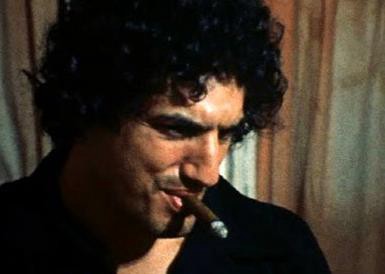My Beautiful Dark Twisted Fantasy Man
by Alexandra Molotkow

I first watched the 1972 film Last House On the Left with a long-term boyfriend — a “real nice guy,” in the parlance of ’70s films, a dead ringer for Cameron from Ferris Bueller’s Day Off who treated me like a princess and would never have hurt me, even if I’d asked him to. And so began my fascination with the film’s lead: the brutally handsome David Hess.
In Last House, Hess plays a character named Krug Stillo. What kind of person do you imagine Krug Stillo to be? If you answered “Dutch jazz percussionist,” you are wrong. Krug Stillo is an escaped convict and the ringleader of a gang of lunatics who rape and murder two teenage girls, then get counter-murdered by one of the girl’s parents. Krug is also a demented caricature of the alpha male, with a fat squiggle of lip, a chin like a jagged rock, and an antihalo of black curls. He struts around with a gun, in a tight white T-shirt whose smell probably walks that voluptuous line between musk and BO.
In real life, David Hess was not evil. He was a singer-songwriter who, as a teenager in the ’50s, composed a battery of hits for Elvis Presley, Sal Mineo, and Bobby Darin, and became the first artist to record “All Shook Up.” He even wrote the soundtrack for Last House — between takes, on an acoustic guitar — and it’s pure ’70s folk-pop, with flute and everything. By the time Last House came out, Hess had served as head of A&R for Mercury Records; recorded a rock opera with John Corigliano; attended both Juilliard and Columbia, where he studied graduate-level archaeology; and played competitive rugby. He passed away last October, after a full and seemingly well-lived life.
So Hess was in fact a rather nice caricature of the alpha male. Since I am not typically attracted to alpha-male types, it’s the “caricature” here that gets me. Hess was so manly and accomplished that he makes such manliness and accomplishment seem just a little bit off. And off-nes is, I think, the root of attraction: a quality that is unfamiliar and thus mildly threatening, and which probably appeals to us because our brains want to keep us from having sex with our brothers. He had hair to rival Engelbert Humperdinck’s, a chin that could have bludgeoned Bobby Sherman; he could have graced high school lockers and studded for bored housewives. Unfortunately, no high school student or bored housewife wants to fantasize about Krug Stillo. At least not openly.
After Last House demolished his shot at mainstream success, Hess went to Europe, where he starred as a psycho in two more movies — Hitch-Hike and House on the Edge of the Park — comprising what is now known as the “David Hess Rape Trilogy.” The Hessian psycho developed the quality of a bachelor uncle, the obnoxious ne’er-do-well who mocks his nephews and laughs at his own jokes. His freakiness is mitigated by a deeply pathetic streak: in House on the Edge of the Park, in which he crashes a rich-kid party on the outskirts of New York and terrorizes the guests, he wears a yellow leisure suit, watches over an effeminate sidekick, and ultimately gets shot in the balls. In Hitch-Hike, in which he hijacks a bickering couple’s car, he laughs like a hyena and gets shot in the back by the naked woman he just assaulted. He is the bully with the bedwetting problem, before the bedwetting problem is diagnosed as latent psychopathy.
I’m going to pause for a minute here and add a disclaimer. I am not ashamed of finding David Hess attractive in his films, because I don’t think attraction has any moral quality by itself. But sometimes Moral Me hates the me that gets attracted to immoral characters. Moral Me is ashamed to tell you about my attraction to Onscreen Hess, because Moral Me is disgusted by sexual violence, and feels sympathy for, and rage on behalf of, those who’ve endured it, and is keenly aware of what’s politically appropriate. Some of you might side with Moral Me, but others of you, I suspect, will be familiar with how much of a bummer it can be to mediate between these two.
When the villains die at the end of Last House (as with many of those rape-revenge movies, as they’re known), it’s not just poetic justice: it absolves the viewer from any illicit pleasure they’ve derived from the film thus far. Righteous violence — violence that we can root for — restores our confidence in our instincts, reminds us that we’re moral, even if our minds harbor a few Beetlejuice sandworms that prod us toward grimy horror flicks. Likewise, Onscreen Hess’s ridiculous qualities make me feel better about finding him sexy. I’m never totally in his thrall, I’m never rooting for him, and I’m always glad when he’s dead. And when the film is over, and I remember that Hess was not Krug Stillo but rather a handsome actor and family man, I regain faith in my ability to separate weird id stuff from feelings and beliefs that belong in the world.
There are two kinds of fantasy men: dream and nightmare. Dream man is smoldering and bighearted and would kill Krug Stillo if he ever met him; he is David Hess as lionized in obituaries. Nightmare man is a blurry, shapeshifting weirdo that I would never want to meet in real life, and who makes me so uneasy that my discomfort slopes into a little prick of attraction. I have absolutely no idea why this is. I suspect there is no “why,” besides the fact that sexual fantasies come from a bizarro realm where down is up and hamburgers eat people.
Alexandra Molotkow is a writer and editor whose favorite David Hess song is “The Closer She Gets.”